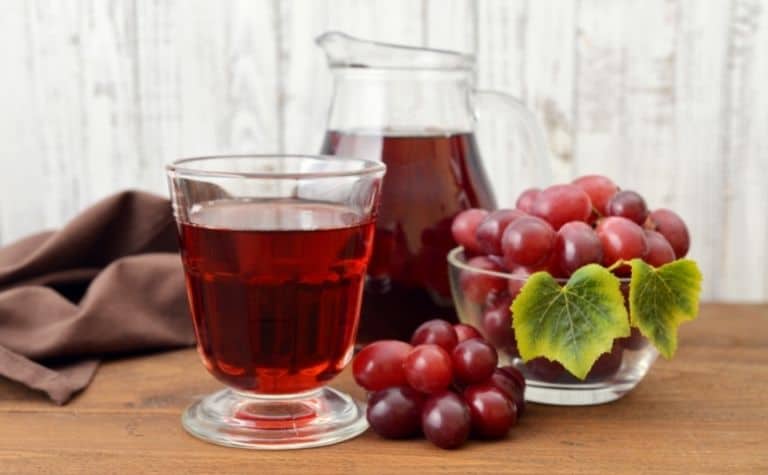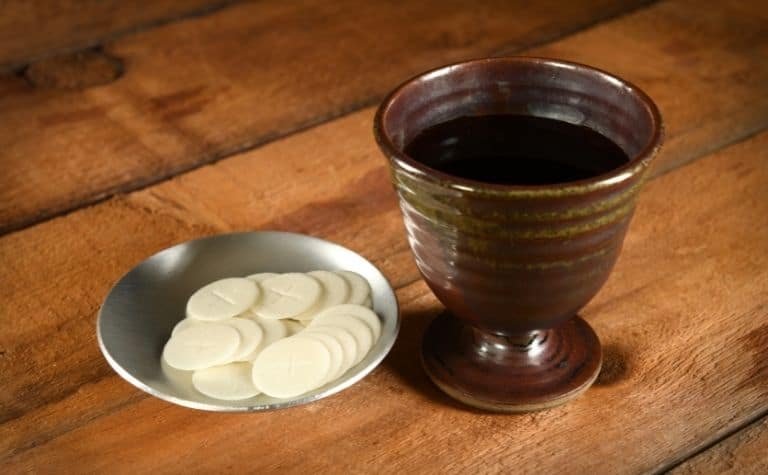Using grape juice during communion is common in Protestant churches, especially in North America. In fact, some Protestant Christians don’t realize that other traditions still use wine.
Many Protestants drink grape juice at communion instead of wine because of the potential dangers and negative connotations associated with alcohol. Some Protestants believe drinking alcohol is always wrong. Others believe that serving grape juice removes concerns related to children and alcoholics.
What do denominations like Baptist, Methodist, Presbyterian, Lutheran, Assemblies of God, and Episcopalian serve during communion? Did Jesus serve wine or grape juice at the Lord’s Supper? Does the Catholic church serve wine or grape juice during the Eucharist? Does the Bible prohibit moderate drinking? Keep reading to learn more.

Do Protestants Churches Serve Wine at Communion?
Protestant churches don’t have a central authority figure like the pope, so each tradition has the freedom to practice the Lord’s Supper according to their own convictions. (Also, see Here’s Why Protestants Reject the Authority of the Pope)
Do Baptists use wine or grape juice? The vast majority of Baptists use grape juice rather than wine during the celebration of communion. Although views in some Baptist traditions are changing, historically, they opposed drinking alcohol in general. Man keep this practice today for biblical and health reasons. (Also, see Protestants vs. Baptists: What’s the Difference?)
Do Methodists use wine or grape juice? Methodists mostly use grape juice during the Lord’s Supper. They began doing this during the temperance movement, especially in the early 20th century in North America.
A former Methodist preacher, Thomas Welch (of Welch’s Grape Juice), started a juice company to produce grape juice for communion that wouldn’t spoil. Many Methodists today still encourage temperance for a variety of reasons.
Do Lutherans use wine or grape juice? Lutheran churches use wine during communion. They believe that this is the most biblical practice since the phrase “fruit of the vine” most easily refers to wine rather than grape juice.
Although they maintain that using wine should be the usual practice of the church, they allow exceptions for those who are underage and others who can’t drink alcohol for various reasons. [2]
Do Presbyterians use wine or grape juice? Most Presbyterians use grape juice during communion. They do this out of respect for tradition and not to be a stumbling block for alcoholics and those who choose not to drink.
However, many Presbyterians drink alcohol at home or out in public since most don’t consider drinking immoral. (Also, see Protestant vs. Reformed: What’s the Difference?)
Do Assemblies of God use wine or grape juice? Since its conception, the Assemblies of God denomination has supported abstinence in regard to alcohol. The tradition emphasizes the negative health effects of drinking and points to the destructive effects that alcohol has had on families and individuals.
Employees of Assemblies of God churches can’t drink, although members have the liberty to do so. [3] (Also, see Protestant vs. Pentecostal: What’s the Difference?)
Do Episcopalians use wine or grape juice? Episcopalians use wine during the celebration of the Eucharist. In fact, although they differ theologically in many ways, Episcopalian church services have many similarities with Catholic services.
Many Episcopalians drink alcohol. In general, the Episcopal Church allows church members the liberty to explore for themselves what they consider issues of conscience. (Also, Protestants vs. Anglicans: What’s the Difference?)

Was Wine or Grape Juice Served at the Last Supper?
Many Bible scholars argue that Jesus served wine, not grape juice, at the Last Supper. Certain passages in the Gospels use the phrase “fruit of the vine” (e.g., Matt. 26:29), which they contend is shorthand for wine.
This viewpoint also points out that before the age of refrigeration and pasteurization, many people didn’t drink grape juice because of the speed at which it spoiled. (Also, compare the Catholic Lord’s Prayer vs. Protestant Lord’s Prayer)
In fact, many people in ancient cultures often didn’t drink water because access to clean water wasn’t always available. For this reason, many ancient people drank wine diluted with water.
Does the Catholic Church Use Wine or Grape Juice for the Eucharist?
The Catholic Church uses wine, not grape juice, during the celebration of the Eucharist. However, it can’t be just any wine. It must meet a particular set of standards.
After all, Catholics believe in transubstantiation, which means that the bread and wine turn into the body and blood of Jesus. Thus, the church approaches the selection of the communion elements with great care. (Also see Why Don’t Protestants Believe in Transubstantiation?)
Does the wine have to meet certain specifications? Yes. According to Canon Law 924.3, the wine must be of a valid and licit matter: “The wine must be natural from the fruit of the vine and not spoiled.” [1]
The General Instructions of the Roman Missal clarifies this further by requiring that the wine must be made from grapes, be “natural and adulterated,” and cannot include any “extraneous substances”: The wine for the Eucharistic celebration must be from the fruit of the grapevine (cf. Lk 22:18), natural, and unadulterated, that is, without admixture of extraneous substances. [2]
Often in the production of fermented beverages, craftsmen will add other ingredients to speed up or enhance the fermenting process. Wine is somewhat unique in that it will naturally start fermenting on its own without any other components.
The Catholic Church does allow the addition of a small amount of sulfite, which is a preservative put into wine, to avoid re-fermentation, which would ruin the purity of the wine.
Who supplies the Catholic church with wine? Because of the above strict standards, a limited number of winemakers supply sacramental altar wine to the Catholic Church.
One of these winemakers is William Ouweleen of O-Neh-Da Vineyards. His vineyard is based in Conesus, New York, and he uses minimal intervention in his wine-making process. (Also see Do Protestants Believe in the Saints?)
Ouweleen argues that the sulfite they use in wine doesn’t exist in the wine itself, so it maintains its purity but rather in a solution alongside the wine. He chooses to use the sulfite because, without it, the wine would turn into a sort of vinegar and thus lose its purity. His vineyard is the oldest “dedicated” winery in the United States.

Does the Bible Prohibit Moderate Drinking?
Some Christians argue that the Bible condemns drunkenness, not drinking alcohol in moderation. In fact, the Bible sometimes associates wine with joy and celebration:
Amos 9:14 reads, “I will restore the fortunes of my people Israel, and they shall rebuild the ruined cities and inhabit them; they shall plant vineyards and drink their wine, and they shall make gardens and eat their fruit” (ESV).
For a New Testament example, consider that in John 2:1-11, a social crisis developed when the wine ran out during the wedding at Cana. Jesus didn’t take the opportunity to condemn the drinking of alcohol.
Instead, as his first miracle, he chose to turn water into wine. Because of this, as the argument goes, it seems that Jesus would have had no moral qualms about serving wine at the Last Supper. (Also, see Protestant vs. Eastern Orthodox: What’s the Difference?)
Other Christians have a different view. Certain Baptists and some other traditions with them argue that Jesus and the disciples didn’t drink wine at the Last Supper.
They point to the fact that the Bible never uses the word “wine” during descriptions of the Last Supper. According to this line of thinking, the phrase “fruit of the vine” refers to fruit juice that isn’t fermented — essentially, grape juice.
This viewpoint adds that although the phrase “fruit of the vine” could signify “wine,” it most naturally means grape juice. Otherwise, why wouldn’t an author use the word “wine?”
Proponents of this view also argue that the word for “wine” in the Bible can refer to both fermented and unfermented grape juice.
How does the abstinence view understand verses like Amos 9:14? When the Bible refers to wine positively, it’s referring to the unfermented version. The Bible also includes a multitude of examples of people using alcohol excessively and unwisely, which are critically important factors.
Some maintain that since there is so much potential for abuse, it’s better to avoid drinking altogether. This would include during communion.
References:
[1] Source
[2] Source
[3] Source
[4] Source
[5] Source
Related Questions
Catholic vs. Protestant vs. Orthodox: What's the Difference?
Roman Catholicism, Protestant Christianity, and the Eastern Orthodox Church are the three historical branches of the Christian religion. Each tradition traces its doctrines and practices to the New...
Protestantism and Eastern Orthodoxy are two of the three historical branches of the Christian faith, along with Roman Catholicism. Though the Orthodox tradition is approximately 500 years older than...
